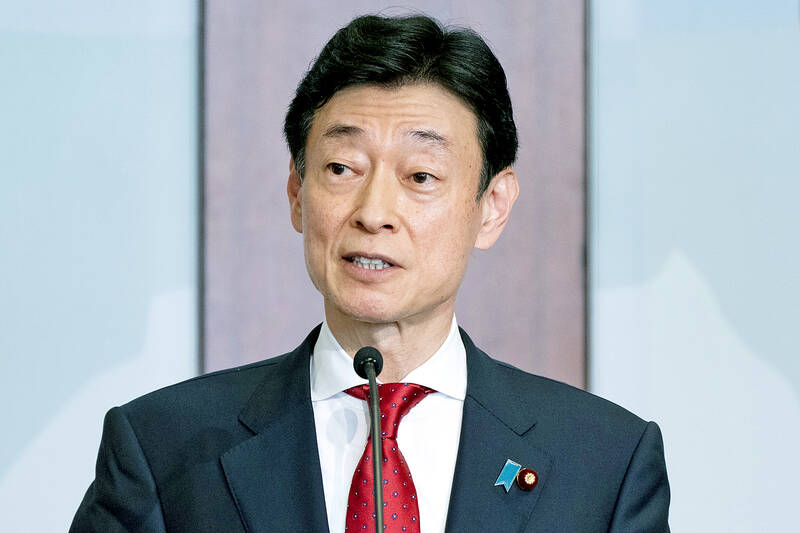Japan wants G7 countries to take a coordinated approach this year aimed at preventing the “economic coercion” that China has applied to some of its trading partners.
Actions taken by China in the past few years, such as suspending imports of Taiwanese pineapples and Australian wine, represent a “clear and present danger” for economies around the world, Japanese Minister of Economy, Trade and Industry Yasutoshi Nishimura said in Washington on Thursday.
“We expect effective responses to economic coercion will be a major item at this year’s G7 summit,” he said.

Photo: AP
Japan is the rotating head of the G7 industrial democracies this year and is scheduled to host the group’s summit in October.
Nishimura said that “countermeasures” might be necessary to help countries and regions that are the target of restrictive trade practices by authoritarian regimes.
Identifying chokepoints that could be used by such regimes would also be helpful, he added.
China has repeatedly applied economic retribution toward trading partners amid diplomatic disputes. Japan itself saw its imports of rare earths from China — crucial to a number of manufacturing supply chains — affected in 2010 following a maritime incident in contested East China Sea waters.
Beijing has criticized G7 nations for what it says are their own protectionist moves designed to prevent China’s economic rise.
The Chinese Ministry of Foreign Affairs said that export controls on semiconductors imposed by the Washington hurt the global economy and US businesses.
Late last year, China also accused the UK of abusing state power in overturning a chip-factory deal.
Nonetheless, Nishimura indicated his intention to press ahead with such policies in remarks following a meeting with US Secretary of Commerce Gina Raimondo, at which Jiji Press said they discussed cooperation on chip equipment export restrictions.
If Japan proceeds with a plan to restrict local chip equipment companies, including Tokyo Electron Ltd and Nikon Corp, from selling advanced products to Chinese customers, it would mark a major victory for US President Joe Biden’s increasingly aggressive campaign to prevent China from acquiring key foreign technologies.
Nishimura said that democratic powers made a mistake more than two decades ago in assuming that deepening economic interdependence, by bringing China and then Russia into the WTO, would “unquestionably bring about a peaceful world” following the end of the Cold War.
Rather than prosperity helping to build peace, it only increased geopolitical risks as authoritarian governments used growth and advancement to boost their power, Nishimura said.
“The free trade system ended up increasing the legitimacy of authoritarian regimes,” he said. “The illusion we embraced ended up amplifying the threat of hegemonic powers.”
At the same time, there is no way to “turn back the clock,” and a complete economic decoupling is “impossible,” Nishimura said.
He urged greater coordination among free-market democracies on measures including export controls, boosting supply chain resilience and energy security.
He also said that, given how the WTO’s dispute-settlement mechanism is now effectively crippled, Japan, the US, Europe and other like-minded partners need to “work hard on reform of the WTO.”
That would be “one of biggest challenges we need to work toward this year,” he said.

Taiwanese actress Barbie Hsu (徐熙媛) has died of pneumonia at the age of 48 while on a trip to Japan, where she contracted influenza during the Lunar New Year holiday, her sister confirmed today through an agent. "Our whole family came to Japan for a trip, and my dearest and most kindhearted sister Barbie Hsu died of influenza-induced pneumonia and unfortunately left us," Hsu's sister and talk show hostess Dee Hsu (徐熙娣) said. "I was grateful to be her sister in this life and that we got to care for and spend time with each other. I will always be grateful to

REMINDER: Of the 6.78 million doses of flu vaccine Taiwan purchased for this flu season, about 200,000 are still available, an official said, following Big S’ death As news broke of the death of Taiwanese actress and singer Barbie Hsu (徐熙媛), also known as Big S (大S), from severe flu complications, the Centers for Disease Control (CDC) and doctors yesterday urged people at high risk to get vaccinated and be alert to signs of severe illness. Hsu’s family yesterday confirmed that the actress died on a family holiday in Japan due to pneumonia during the Lunar New Year holiday. CDC Deputy Director-General Tseng Shu-hui (曾淑慧) told an impromptu news conference that hospital visits for flu-like illnesses from Jan. 19 to Jan. 25 reached 162,352 — the highest

TAIWAN DEFENSE: The initiative would involve integrating various systems in a fast-paced manner through the use of common software to obstruct a Chinese invasion The first tranche of the US Navy’s “Replicator” initiative aimed at obstructing a Chinese invasion of Taiwan would be ready by August, a US Naval Institute (USNI) News report on Tuesday said. The initiative is part of a larger defense strategy for Taiwan, and would involve launching thousands of uncrewed submarines, surface vessels and aerial vehicles around Taiwan to buy the nation and its partners time to assemble a response. The plan was first made public by the Washington Post in June last year, when it cited comments by US Indo-Pacific Commander Admiral Samuel Paparo on the sidelines of the Shangri-La Dialogue

Suspected Chinese spies posing as Taiwanese tourists have been arrested for allegedly taking photographs of Philippine Coast Guard ships, local media reported. The suspected spies stayed at a resort in Palawan, where from a secluded location they used their phones to record coast guard ships entering and leaving a base, Philippine TV network GMA said on Wednesday. Palawan is near the Spratly Islands (Nansha Islands, 南沙群島) and other disputed areas of the South China Sea, where tensions have been on the rise between China and the Philippines. The suspects allegedly also used drones without permission and installed cameras on coconut trees in the